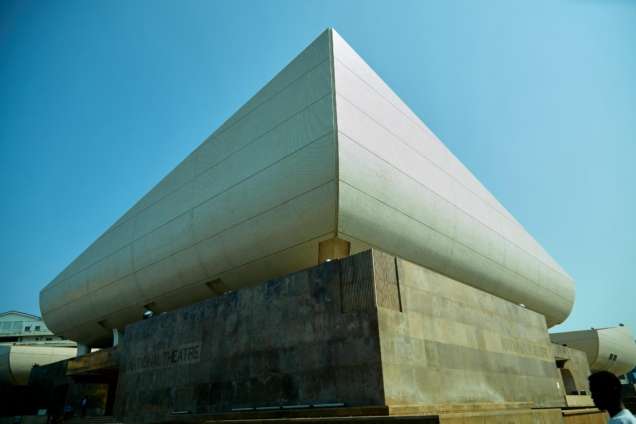Ghana’s theatre and entertainment industry has faced significant challenges threatening its sustainability and growth in recent years.
The Africa Arts Network (AAN), a prominent organization dedicated to the promotion and development of the arts across the continent, has issued a clarion call for urgent tax reforms to support this vital sector.
According to the Network founder, the current tax regime is stifling the growth and development of the sector, pushing many artists and entertainment businesses to the brink of collapse.
“Theatre and live entertainment are essential to Ghana’s cultural identity and economic development. Yet, this 21.9% tax on ticket revenue makes it nearly impossible for productions to break even, let alone thrive.
“The result is a growing reluctance to invest in creative projects, reduced employment opportunities, and a disservice to the promotion of Ghanaian culture.”
Kofi Adinkra, founder, Africa Arts Network (AAN)
Kofi Adinkra mentioned that theatre productions and entertainment events face taxation at various stages, compounding financial pressures on producers.
These include venue rentals, production-related goods and services, professional fees, and the 21.9% taxes on ticket sales which directly impact revenue, leaving producers with limited resources to cover costs or reinvest in future productions.
“These multiple taxation points collectively reduce the profitability and sustainability of theatre productions and other live entertainment events.”
Kofi Adinkra, founder, Africa Arts Network (AAN)
Ghana boasts a rich cultural heritage that is expressed through its vibrant theatre and entertainment scene.
From traditional performances to contemporary plays, the industry has been a significant contributor to the nation’s economy and cultural identity.
The COVID-19 pandemic severely impacted live performances, leading to a decline in revenue for theatre companies and artists. Many have struggled to recover, facing rising costs and diminishing audiences.
Unlike other sectors, the arts often receive limited support from the government and private investors. This lack of funding has hindered the development of new productions, training programs, and infrastructure.
The current tax regime places a heavy burden on artists and theatre companies, making it difficult for them to sustain their operations. High taxes on ticket sales, production costs, and income have stifled creativity and innovation.
The Call for Tax Reform

The Africa Arts Network has identified tax reform as a critical step toward revitalizing Ghana’s theatre and entertainment industry.
The organization advocates for a comprehensive review of the existing tax policies that disproportionately affect artists and cultural institutions.
AAN calls for the introduction of tax exemptions for non-profit arts organizations and theatre companies. This would allow them to allocate more resources toward production, talent development, and community outreach.
According to Kofi Adinkra, theatre productions are already grappling with high costs, including venue rentals, technical equipment, marketing, and cast and crew salaries.
With slim profit margins, he said tax on ticket revenue adds a burden that threatens the viability of many productions.
Referencing the recent production of You Play Me I Play You, the founder of Africa Arts Network revealed that “the production faced general high production costs across the board, from logistics to marketing.”
“While the tax burden compounded the issue, the overall expenses of staging such a production made it incredibly challenging to break even. We had to borrow money from other sources to pay debts and taxes, plunging the organization further into financial strain.
“Imagine putting your heart and soul into a production, only to see nearly a quarter of your ticket revenue deducted in taxes. Producers are left with limited resources to cover their costs or reinvest in future projects.”
Kofi Adinkra, founder, Africa Arts Network (AAN)
The organization urges the government to lower the Value Added Tax (VAT) on ticket sales for live performances. This reduction would make theatre more accessible to the public, encouraging greater attendance and participation in the arts.
The network advocates for tax breaks or grants for emerging artists and playwrights, enabling them to produce new work without the burden of significant financial risk.
Implementing these tax reforms could have far-reaching effects on Ghana’s theatre and entertainment industry.
With more financial resources available, theatre companies could invest in high-quality productions, enhancing the overall standard of performances and attracting larger audiences.
The Africa Arts Network’s call for tax reform represents a crucial step toward safeguarding and revitalizing Ghana’s theatre and entertainment industry.
By addressing the financial challenges faced by artists and cultural organizations, these proposed reforms could foster a thriving arts ecosystem that enriches the cultural fabric of the nation.
As Ghana navigates the path to recovery and growth, prioritizing the arts will not only benefit the industry but also the society at large, enhancing creativity, community engagement, and national identity.
READ ALSO: Edudzi Slams EC Over Re-Collation Exercise, Jean Mensa’s Integrity Questioned























